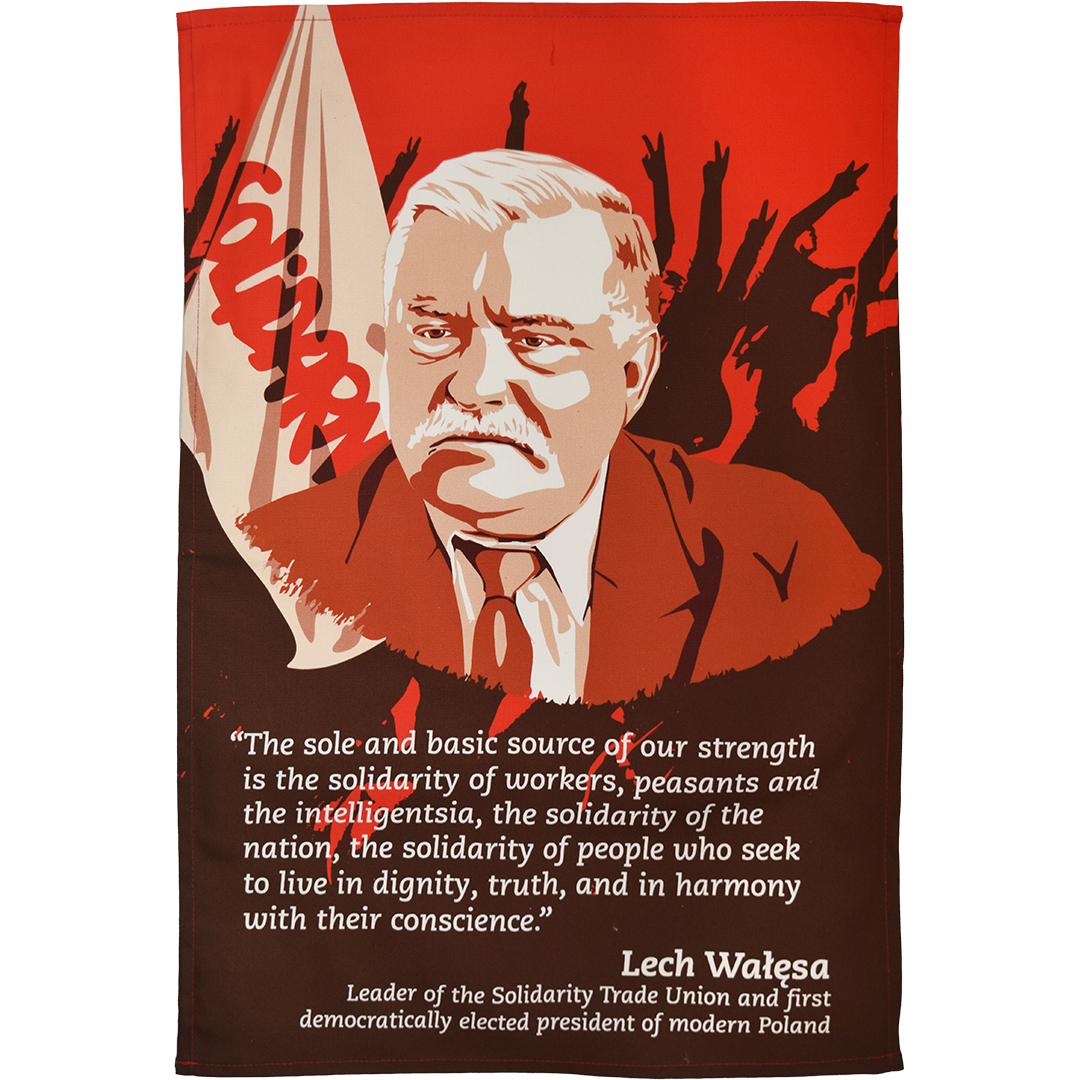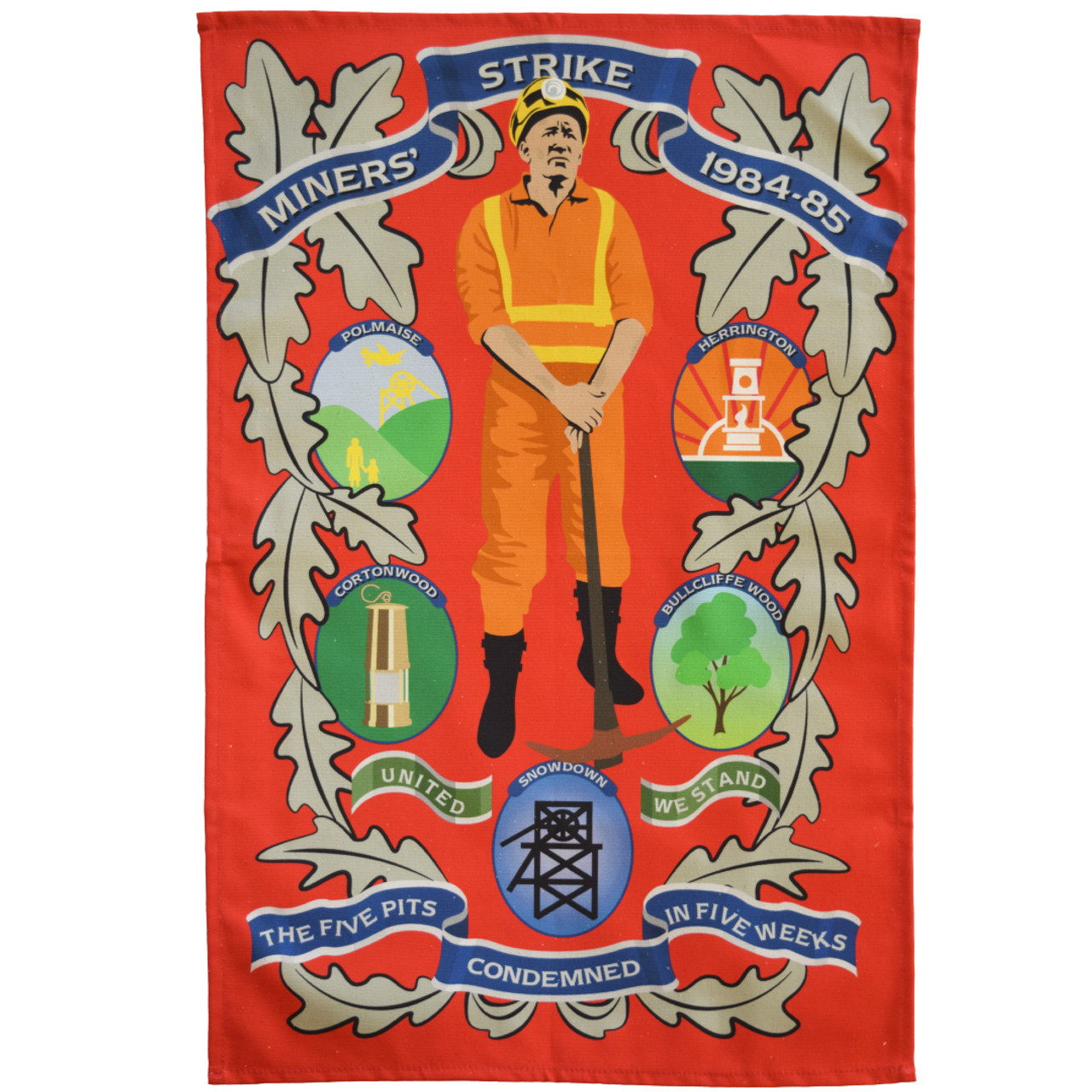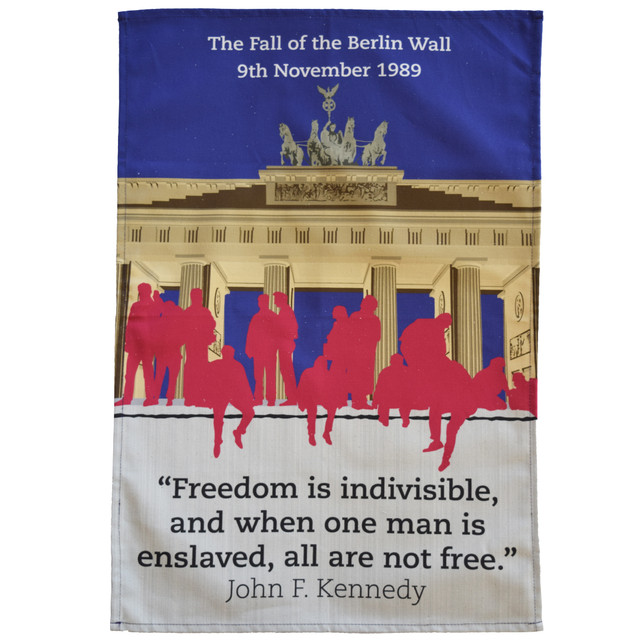We use cookies to make your shopping experience better. By using our website, you're agreeing to the collection of data as described in our Privacy Policy.
Solidarity for Freedom
On Lech Wałęsa's birthday, we look at the story of Polish trade union Solidarity and its challenge to Communist oppression
The Communist dictatorship in Poland was overthrown by one of the least capitalist forces imaginable: organised labour.
Poland was one of the main industrial centres in the Soviet bloc, with a large industrial working class.
The Polish workers sought to improve the material position of their class, and to liberate their country from imperial domination by the Soviet Union.
So when the Communist government of Poland raised food prices in the 1970s at a time when wages were stagnant, Polish workers began to protest.
Lech Wałęsa helped found 'Solidarity' and later became the first democratically elected post-Communist President of Poland
See the new Lech Walesa tea towel
In June 1976, thousands joined demonstrations in cities like Radom and Warsaw. The state cracked down hard, and three protestors were shot by the police.
Independent trade unions were illegal in Communist Poland, but several operated in secret to help organise and support the workers' movement.
The economic downturn continued through the later 1970s. In 1979, the Polish economy contracted for the first time since 1945.
Worker militancy continued to grow despite state repression, until things came to a head in the Lenin Shipyard in the Baltic port city of Gdansk.
On 7 August 1980, Anna Walentynowicz, a radical labour organiser, was fired for membership of an illegal trade union just five months before she was due to retire.
The Gdansk workforce was outraged by the injustice.
Everyone went out on strike, chanting:
"Bring Anna Walentynowicz back to work!"
Afraid by the scale of worker mobilisation, the Gdansk bosses quickly backed down.
Some of the workers were content to leave it at that. But Walentynowicz and another organiser, Alina Pienkowska, were key to keeping everyone mobilised and turning the demand for local concessions into a wider vision of democratic change in Poland.
The striking workers at Gdansk created the 'Solidarity' trade union, and demanded recognition by the state.
"Our day-to-day motto should be: 'Your problems are also my problems.' We must extend our friendship and strengthen our solidarity."
The 1980s saw trade unions challenge the state - in both East and West
See the Miners' Strike tea towel
On 17 August 1980, Solidarity was recognised by authorities in Gdansk. By September, it was operating nationwide.
This was a momentous step. Solidarity was the first trade union independent of the state to be given official recognition in the Soviet Bloc.
Solidarity offered an unprecedented space for free political organisation and protest in Poland, and Polish workers jumped at the opportunity.
Ten million people had joined by September 1981 – a third of the working age population.
As Solidarity grew during and after the Gdansk strike, Lech Wałęsa, born on this day in 1943, emerged as its figurehead.
A worker from Popowo, Wałęsahad a long track record as a militant organiser, although his role in founding Solidarity has often been exaggerated at the expense of women workers like Walentynowicz and Pienkowska.
By late 1981, the Polish government was getting cold feet about Solidarity. The union was growing too fast and too freely.
In December, martial law was declared as the dictatorship scrambled to stop Solidarity.
But the Communist government was too late. Solidarity continued to grow underground during the 1980s.
The movement received hypocritical support from right-wing, union-bashing governments in the U.S. and the U.K.
Margaret Thatcher praised the Solidarity trade union as a symbol of freedom while she violently crushed organised labour in Britain during the
Miners' Strike. But Polish workers could see right through this. One Solidarity member in Upper Silesia said:
"Neither the British government's mounted police charges nor its truncheon blows, any more than the Polish junta's tanks or rifle fire, can break our common will to struggle for a better future for the working class." - David Jastrzębski, President of Upper Silesia Solidarity
Solidarity survived and grew during the 1980s due to the support of the Polish people, not foreign powers.
So, when the Polish regime began to teeter in 1989, unable to maintain martial law at the same time as an economic crisis, it opened talks with the underground Solidarity leadership on holding free parliamentary elections.
This was one of the first dominoes to fall as Communist dictatorship rapidly fell apart in Poland and the wider Soviet Bloc after 1989.
Solidarity won the elections, and Lech Wałęsa was soon elected President of a newly democratic Poland.
The rise of Solidarity and the fall of the Berlin Wall precipitated the collapse of communist regimes in Eastern Europe
It is a common misconception that Western free marketeers brought down the Soviet empire in Central and Eastern Europe.
But from the
Hungarian Uprising of 1956 to the rise of Solidarity in Poland, it was more often the sort of people that Margaret Thatcher and Ronald Reagan despised – organised labourers, democratic socialists – who kept resisting dictatorship in Soviet Europe, until it was overcome.






